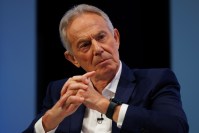Clothing retailers have saved Rachel Reeves from having to go naked into the debating chamber. As the Chancellor rises to deliver her Spring Statement today, she will have the comfort of knowing that the Consumer Prices Index (CPI) has fallen from 3.0 per cent to 2.8 per cent – and unexpectedly at that.
The main reason is that clothing retailers cut their prices by 0.3 per cent in February – against a 2.1 per cent rise in February 2024. The fall will help ease pressure on households, but nothing like as much as it will ease pressure on Reeves herself. A revival of the cost-of-living crisis is the last thing that she needs to counter the effect of a stagnant economy and the rise in employers’ National Insurance Contributions to take effect next week. In fact, given that average earnings rose by 5.9 per cent in the year to February, UK workers might appear on the face of it to be having the time of their lives, enjoying a real-terms increase in pay of nearly three per cent.
Yet few people will be feeling that way. The Chancellor is lucky that economic commentators have decided all but to ignore the alternative Consumer Prices Index, including owner occupied housing costs (CPIH) – which is now officially the government’s preferred index. CPIH also fell slightly in February, yet at 3.7 per cent is running markedly higher than CPI – in contrast to the run of recent years when it has tended to run a little lower. Taken on their own, owner occupied housing costs rose 7.5 per cent in the year to February, largely on account of higher interest bills as households finding themselves having to remortgage at higher fixed rates. On top of this misery, many homebuyers will suffer higher rates of stamp duty from next week.
However, Reeves will have the comfort of knowing that the slight fall in inflation will make it more likely that the Bank of England will vote to lower interest rates next month. Having inherited a CPI which appeared to be under control, Reeves seemed doomed to suffer a revival in inflation – which was already up from 2.0 per cent to three per cent on her watch. As well as cheering households, a falling CPI will mean a drop in the government’s borrowing costs as the UK has an unusually high proportion of its borrowing in index-linked gilts. However, bond markets matter too, and we will find out later what they make of Reeves’ fiscal plans. They didn’t like the Budget, which they saw as making it more difficult for the government to service its debts – the yield on 10-year gilts is now higher than it was in the wake of Kwasi Kwarteng’s ill-fated mini budget in September 2022. To judge by the noises Reeves has made about cutting spending, they ought to like the Spring Statement a bit more. But now she has created the expectation that she will bring spending under control, trimming the welfare bill and slashing the cost of government administration, she will need to live up to her promise.







Comments